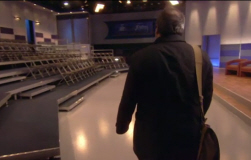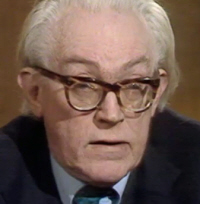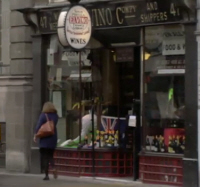Sex Discrimination Act
Equality for Women

Granada Studio
By the middle years of the 1970s, the generation shaped by the sacrifice of the Second World War were looking on in horror as a new Britain
erupted around them, unsettling, aggressive and unashamedly ambitious.
New Year's Eve, 1975. And for the nation's delectation, the Wheeltappers and Shunters Social Club, hosted by Bernard Manning. The club may
have looked authentic but it was actually based at Manchester's Granada Studios. Home today to ITV's Jeremy Kyle show.
Jutting out here into the audience was the stage, orchestra in the corner, bar behind me, presided over by the irrepressible Bernard Manning. He
even had a one-eyed barman. It was his job to pour pints of draft Double Diamond bitter for the gents and lager and lime for the ladies.
The Wheeltappers was prime-time Saturday night TV, a chance for millions to settle down for some good old family entertainment.

Michael Foot
70s Britain was a man's world, where, like the clouds of high tar cigarette smoke, casual male chauvinism that hung heavy in the air. Yet that
New Year, for the women in the audience, life was about to change.
Michael Foot "Today is the day when the sex discrimination act comes in. Women at last get a fair deal they deserve."
When Bernard's New Year revellers shook off their hangovers the next morning, Britain, under the new discrimination law, was transformed.
Fairer and more enlightened.
Well, so went the theory.

Bernard Manning at the Wheeltappers
I've tracked down a copy of the Wheeltappers and Shunters Handbook for 1976. Inside it reports that, thanks to the Sex Discrimination Act, ladies
will now be eligible for election onto the committee. But which ones? "After much deliberation it was decided that we should approach Raquel Welch,
Brigitte Bardot and Linda Lovelace."
The treatment of women at the Wheeltappers was far from exceptional and 70s Britain.
TV Presenter "For thousands of years, man has regarded woman as a thing apart. Contrary, unpredictable, goddess and bitch."
Across mainstream entertainment women were routinely portrayed as sexual playthings.

Helen Mirren with Parky
Michael Parkinson "First, one of our rising stars of the theatre and, I quote, 'She is especially telling projecting sluttish eroticism'. She
is Miss Helen Mirren."
And some people should have known better.
Michael Parkinson "I mean, you are, 'a serious actress' but do you find what could best be described as your equipment in fact hinders you, perhaps,
in that pursuit?"
Helen Mirren "I'd like you to explain what you mean by 'my equipment'."
Michael Parkinson "well, your physical attributes."
Helen "You mean my fingers?"

Helen Mirren
Today, it's easy to be shocked by this sexism on the Parkinson sofa. But from the bedroom and the boardroom, to academia and politics, women
often faced tremendous obstacles.
Even in the corridors of power, sexual inequality was hard to shift.
When Margaret Thatcher became leader of the Tory opposition in 1975, she was one of only 23 female MPs in a house of 516. Just moments from
Westminster, the new discrimination act was put to the test.
The El Vino wine bar had been serving the journalists of London's Fleet Street since Victorian times. And women here had always known their
place. This is the bar. And this was for the boys. If you were a woman and you wanted a drink you had to go and sit down there at the back, out
of sight, where nobody could see you, and wait to be served. But on the day the sex discrimination act came into operation, a female journalist
came in and tried to order a drink here at the counter and the barman refused to serve her.

El Vino's
On the face of it, discrimination pure and simple. And now, of course, against the law.
What made El Vino's exceptional was that it was patronised by women who worked in Fleet Street, by and large journalists.
So you had a particularly articulate, ambitious and committed group of women, sick of being relegated to the back room. To the horror of the blokes at
the bar, the feminist protesters won their case. It was a small legal recognition that Britain's women were no longer content with life
in the bedroom and the kitchen.
But, for many women, equal treatment didn't just mean drinks at the bar after work. Genuine equality was a question of cold hard economics.





